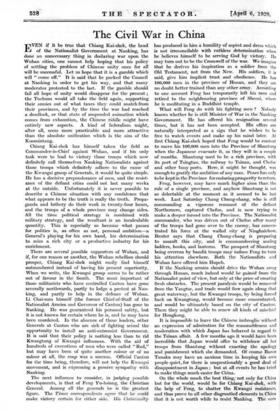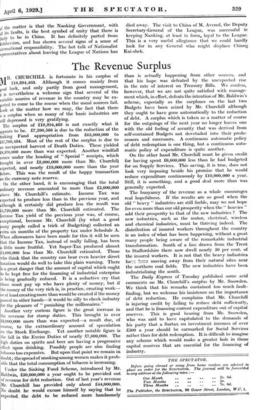The Civil War in China
"FiVEN if it be true that Chiang Kai-shek, the head I of the Nationalist Government at Nanking, has done an unnecessary thing in declaring war upon the Wuhan cities, one cannot help hoping that his policy of settling the problem of Chinese unity once for all will be successful. Let us hope that it is a gamble which will " come off." It is said that he packed the Council at Nanking in order to get his way, and that many moderates protested to the last. If the gamble should fail all hope of unity would disappear for the present ; the Tuchuns would all take the field again, supporting their armies out of what taxes they could snatch from their provinces, and by the time the war had reached a deadlock, or that state of suspended animation which comes from exhaustion, the Chinese riddle might have entirely new aspects. A kind of federalism might, after all, seem more practicable and more attractive than the absolute unification which is the aim of the Kuomintang.
Chiang Kai-shek has himself taken the field as Commander-in-Chief against Wuhan, and if his only task were to lead to victory those troops which now definitely call themselves Nanking Nationalists against those troops which definitely adhere to the cause of the Kwangsi group of Generals, it would be quite simple. Re has a decisive preponderance of men, and the resist- ance of the defiant cities could not last many weeks at the outside. Unfortunately it is never possible to describe a Chinese situation with any confidence that what appears to be the truth is really the truth. Propa- ganda and bribery do their work in twenty-four hours, and the troops of a whole province may change sides. All the time political strategy is combined with military strategy, and the resultant is an incalculable quantity. This is especially so because what passes for politics is, as often as not, personal ambition—a General's playing for his own hand, his determination to seize a rich city or a productive industry for his enrichment.
There are several possible supporters of Wuhan, and if, for one reason or another, the Wuhan rebellion should prosper, Chiang Kai-shek might easily find himself outnumbered instead of having his present superiority. When we write, the Kwangsi group seems to be rather out of favour in the South. The most important of those militarists who have controlled Canton have gone severally northwards, partly to lodge a protest at Nan- king, and partly to help in the defence of Wuhan. Li Chai-sum himself (the former Chief-of-Staff of the Nationalist Armies and Governor of Canton) has gone to Nanking. He was guaranteed his personal safety, but it is not known for certain where he is, and he may have been murdered. In the absence of those leaders, other Generals at Canton who are sick of fighting seized the opportunity to install an anti-extremist Government. It is said that their policy is nothing less than to rid Kwangtung of Kwangsi influences. With the aid of hundreds of executions of men who were called "Red," but may have been of quite another colour or of no colour at ail, the coup was a success. Official Canton for the time being, therefore, will not help the Kwangsi movement, and is expressing a passive sympathy with Nanking.
The next influence to consider, in judging possible developments, is that of Feng Yu-hsiang, the Christian General. Among all the generals he is the greatest figure. The Times correspondents agree that he could make victory certain for either side. His Christianity has produced in him a humility of aspect and dress which is not irreconcilable with ruthless determination when he believes himself to be serving God by victory. lIe may turn out to be the Cromwell of the war. We imagine that he derives his inspiration as a soldier from the Old Testament,, not from the New. His soldiers, it is said, give him implicit trust and obedience. He has 100,000 men in the province of Haman, and they are no doubt better trained than any other army. According to one account Feng has temporarily left his men and retired to the neighbouring province of Shensi, where he is meditating in a Buddhist temple.
What will Feng do with his fighting men Nobody knows whether he is still Minister of War in the Nanking Government. He has offered his resignation several times, but it has not been accepted. His offers are naturally interpreted as a sign that he wishes to be free to watch events and make up his mind later. At first Chiang Kai-shek hoped that Feng would be content to move his 100,000 men into the Province of Shantung when the Japanese evacuate it, as they will in a couple of months. Shantung used to be a rich province, with its port of Tsingtao, the railway to Tsinan, and Chefoo and other busy ports. Here, it might be thought, was enough to gratify the ambition of any man. Peace has only to be kept in the Province for enduringprosperity to return.
Feng, however, may have much higher aims than the rule of a single province, and anyhow Shantung is not so delectable at the moment as it seemed to be last week. Last Saturday Chang Chung-chang, who is still commanding a vigorous remnant of the defiant Northerners, captured Chefoo, and is now trying to make a deeper inroad into the Province. The Nationalist commander, who was driven out of Chefoo after many of the troops had gone over to the enemy, has concen- trated his force at the walled city of Ninghaichow. Reuter says that Chang Chung-chang is preparing to assault this city, and is commandeering scaling ladders, hooks, and lanterns. The prospect of Shantung being overrun by bandit troops may induce Feng to turn his attention elsewhere. Both the Nationalists and Wuhan have offered him Hupeh.
If the Nanking armies should drive the Wuhan army through Hunan, much indeed would be gained from the Nationalist point of view, but only at the price of creating fresh obstacles. The present paralysis would be removed from the Yangtse, and trade would flow again along that great waterway, but the Kwangsi troops, by being forced back on Kwangtung, would become more concentrated, and would be ultimately based on the city of Canton. There they might be able to renew all kinds of mischief for Hongkong.
It is impossible to leave the Chinese imbroglio without an expression of admiration for the reasonableness and moderation with which Japan has behaved in regard to the Tsinan affair. A few months ago it would have been incredible that Japan would offer to withdraw all her troops from Shantung without exacting the apology and punishment which she demanded. Of course Baron Tanaka may have an anxious time in keeping his own people quiet, for there is unquestionably a good deal of disappointment in Japan ; but at all events he has tried to make things much easier for China.
On the whole much the best thing; not only for China but for the world, would be for Chiang Kai-shek, with the help of Feng, to shatter the Kwangsi resistance, and thus prove to all other disgruntled elements in China that it is not worth while to resist Nanking. The sum of the matter is that the Nanking Government, with all its faults, is the best symbol of unity that. there is likely to be in China. It has definitely parted from Bolshevism, and has shown several signs of a sense of international responsibility. The hot talk of Nationalist representatives about leaving the League of Nations has died away. The visit to China of M. Avenol, the Deputy SecretarY-General of the League, was successful in keeping Nanking, at least in form, loyal to the League. This is a very useful allegiance that we could hardly look for in any General who might displace Chiang Kai-shek.







































 Previous page
Previous page